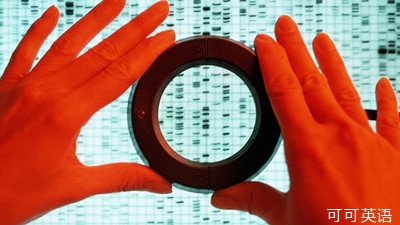Science and technology
科学技术
Biotechnology patents
生物技术专利
Natural justice
自然正义
America's Supreme Court is to rule on the patenting of genes
美国最高法院将对基因专利做出裁决
THE nine justices on America's Supreme Court must apply their minds to the thorniest of legal questions.
美国最高法院的九位法官全力专注于处理这最棘手的法律问题。
 On April 15th they were presented with a particularly testing puzzler: should the law allow people to patent human genes?
On April 15th they were presented with a particularly testing puzzler: should the law allow people to patent human genes?
4月15日,法官们遇到一个相当棘手的案件:法律是否允许取得人类基因的专利权。
The case is the culmination of a battle that began in 2009.
2009年专利之争使此案件白热化。
It pits America's Association for Molecular Pathology and various other interested parties—represented by lawyers from the American Civil Liberties Union—against Myriad Genetics, a biotechnology firm that holds patents on two human genes, called BRCA1 and BRCA2.
案件起源于美国分子病理学学会与其他利益相关方—由来自美国民权同盟的律师代表—联名起诉麦利亚德基因公司,该生物技术公司持有名为BRCA1 和 BRCA2的两个人类乳腺癌基因专利。
That makes Myriad the sole producer of tests to detect mutations in those genes.
专利的授权使麦利亚德公司成为检测这两个基因突变的基因测序独家供应商。
Such mutations often increase a woman's risk of developing breast or ovarian cancer.
这些基因突变常会增大女性患乳腺癌及卵巢癌的风险。
It is an emotionally charged question.
这是一个带着感性色彩的案件。
Patent offices around the world have been granting patents on genes, human and otherwise, for decades, but time has done little to soften opposition to the idea.
虽然世界各地的专利局数十年来一直授予人类基因或者其他基因的专利,但也未能减缓外界对这一做法的反对。
Laymen are often baffled when they find out that it is possible to patent parts of the human genome.
部分人类基因可注册专利常使得非专业人员感到困惑。
Anti-patenting campaigners argue that the idea of claiming a patent over the shared genetic heritage of the human race is absurd, immoral or both.
反对专利注册的人认为,对共享的人类遗传基因申请专利的做法是荒谬的或不道德的,或两者皆有。
But the court is unlikely to base its ruling on such airy ethical principles.
但法院是不大可能依据这些不切实际的道德准则来对此案件进行裁决的。
The legal debate revolves not around the two genes' humanness, but their naturalness—for the judges are being asked to rule whether Myriad's genes count as a product of nature.
法律争辩的焦点不在于基因的人类性,而是在于它们的自然性—因为法官理应裁决麦利亚德公司的基因是否算是自然产物。
If they do, then under American law they cannot be patented.
如果是的话,那在美国法律规定下,这些基因就不能被注册专利。
At first glance, it may seem odd to argue that a gene is anything other than a product of the natural world.
乍看之下,这可能看上去很奇怪,争论基因是否只是自然界产物。
But Myriad's patents do not cover the genes as they occur in living cells.
但麦利亚德公司的专利并不包括活细胞中存在的基因。
Rather, they cover isolated forms of the genes, which have been identified, snipped from the genome and chemically modified to make them analysable in a laboratory.
恰恰相反,专利涉及的是这些基因的分离基因,已被测定的分离基因是从基因组中剪切出来经化学方法修饰后可用于实验室实验分析的一类基因。
Myriad argues that these alterations, and the new use to which the resulting gene is put as part of a diagnostic test, make their product sufficiently innovative to be worthy of the law's protection.
麦利亚德公司声称这些改造基因,以及合成基因用于诊断测试的这类新应用,使他们公司产品足够创新,值得受到法律的保护。
The plaintiffs say this reasoning is spurious: the chemical changes are trivial, and the resulting bit of DNA useful only because it is identical in every meaningful way to the version that occurs in vivo.
原告们则认为这种逻辑带有欺骗性:化学改造不重要,DNA合成之所以有用只是因为与源基因在生物体中作用模式完全相同。
Doctors, patients and biotechnology companies are interested in the information content of genes, the argument runs, not the incidental details of their chemical composition.
他们还认为,医生、患者以及生物技术公司感兴趣的是基因的信息内容,而不是化学合成基因所附带的信息。
For a while, the court found itself bogged down in analogies with the patent-eligibility of chocolate-chip cookies and baseball bats.
法庭暂时陷入了像巧克力饼干和棒球棒专利资格似的困境中。
There are other criticisms of Myriad.
还有另外一些对麦利亚德公司的批评。
One is that its patents are too broad.
有人认为麦利亚德公司的专利涵盖范围过大。
The firm's tests look for variations in BRCA genes.
该公司的基因测序是为发现BRCA基因的突变体。
Rather than patenting every conceivable variant, the company claims jurisdiction over isolated DNA sequences, 15 base pairs long, that match short parts of the genes.
他们不是对每一有可能得到的基因突变体持有专利权,而是对一段分离到的基因序列持有专利权,这段基因序列含有15个碱基对,可与BRCA基因短链配对。
An analysis by Jeffrey Rosenfeld and Christopher Mason, of the Sackler Institute for Comparative Genomics and Cornell University respectively, published in Genome Medicine, found that 689 other human genes contain 15-base-pair strings found in BRCA1, suggesting Myriad's patents technically cover those unrelated genes, too.
分别来自赛克勒比较基因组学研究所和康奈尔大学的杰弗里·罗森菲尔德以及克里斯托弗·梅森,在《Genome Medicine》杂志发表的文章中指出,研究发现其他689个人类基因都含有BRCA1基因中的这段15个碱基对的DNA链,这表明麦利亚德公司的专利从学术角度来讲也涵盖这些不相关的基因。
The economics of genomics
基因组的经济学
The arguments ranged beyond the arcana of human genetics and American patent law.
讨论范围超出了人类遗传学的深奥知识和美国专利法之外。
The judges were keen to explore the impact of a hypothetical anti-Myriad ruling on the country's thriving biotechnology industry, which, according to one estimate, was worth 92 billion in 2011.
法官们热衷于探讨的是,一个假设的反对麦利亚德公司专利的裁决会对国家日益繁荣的生物技术行业产生何种影响,据统计,生物技术行业2011年产值为920亿美元。
Several questioned Christopher Hansen, the plaintiffs' lawyer, on what incentive firms would have to identify interesting genes if there were no possibility of winning a patent on them.
有人质疑原告律师克里斯多夫·汉森,如果不能获得专利权,那么公司又有什么动力去发掘有价值的基因。
Developing such tests is not cheap.
基因测序技术的实验花费并不便宜。
According to Mark Capone, Myriad's president, the firm spent around 500m before it had a product it could bring to market.
据麦利亚德公司董事长马克·卡波尼所说,公司在一个生物产品可投入市场之前要花费大概5亿美元。
Others argue that such patents hold back biotechnology, an industry that is changing fast.
另有人认为,这样的专利阻碍了日新月异的生物技术行业的发展。
Donald Verrilli, America's solicitor general, who represents the government's view in the case, pointed out that competitors need the patent-holder's permission to isolate the genes to see if they can develop a better test, or even to examine them for any other effects they may have.
对此案件,政府发言人美国副检察长唐纳德﹒维里利指出,竞争者有了专利持有人的许可去分离基因,才能知道他们自己是否可以研发出更好的测序方法,或者甚至可以研究发现基因其他潜在的价值。
Some observers think an anti-Myriad ruling would have little practical effect.
一些观察员认为反对麦利亚德公司专利权的裁决将不会产生太大的经济影响。
The firm's patents expire in 2015, and technology has moved on.
该公司的专利权有效期截止到2015年,而到那时,生物技术早已有极大的进步。
The cost of genetic sequencing is falling fast, and it may soon be possible for people to have their entire genomes sequenced for less than the roughly 4,000 Myriad charges for its tests.
基因测序成本会大大降低,很快人们也许就可以花费少于4000美元就能对自己全部的基因测序。
Any genes of interest could thus be examined for worrisome mutations, probably without infringing any patents.
从此不用侵犯任何专利权,就可检测基因突变。
And Mr Hansen conceded that much work in modern biotech concerns recombinant DNA, which involves cutting and pasting DNA from different sources to make synthetic sequences not found in nature, something that the plaintiffs agree should be covered by patent law.
而且汉森律师不得不承认,现代生物技术的基因重组,大部分是对不同外源DNA进行剪切、粘贴后形成自然界中不存在的DNA合成序列,这并不违犯专利法。
Whatever conclusion the court comes to, the judges seemed keen to avoid an overly broad ruling.
不管法院裁决结果如何,法官们似乎倾向避免做出过于清晰的裁决。
That may be a legally sensible approach to a knotty question combining genetics, economics and ethics.
这也许是对此涉及遗传学、经济学和伦理学的棘手案件比较合法合理的解决方式。
But, like all good compromises, it risks leaving no one satisfied.
但是,与所有好的折中一样,这样会导致原告被告双方均对裁决不满。
Ideally, America's Congress would set out exactly what parts of the human genome should be patentable.
理想的做法是美国国会应该确切地规定人类基因组的哪些基因可以申请专利。
There is not much chance of that actually happening, though.
不过,这也不太可能会发生。












